Southern California’s December sends me looking for Frost.
Here, it’s likely that the only precipitation a big winter coat will endure is sweat. And kicking palm fronds in my Tevas is just not the same as shuffling booted feet through mounds of mouldering leaves.
But even if our woods here are never “lovely, dark and deep”, there is Robert Frost. New England provides us with culturally quintessential visions of winter. And Frost remains the elemental poetic voice of New England, baring branches with brisk, gusting whorls of ink and leaving crisp, listening silences between.
That’s why I stop by Frost’s proverbial woods this time of year. To cool the early darkness of an un-snowy San Diego evening. To crystallize the too-clement softness of waning December days.
But this December evening I’m at the desk instead of in the reading chair. That’s because I had the good fortune to have a bit of Frost mystery to sleuth.
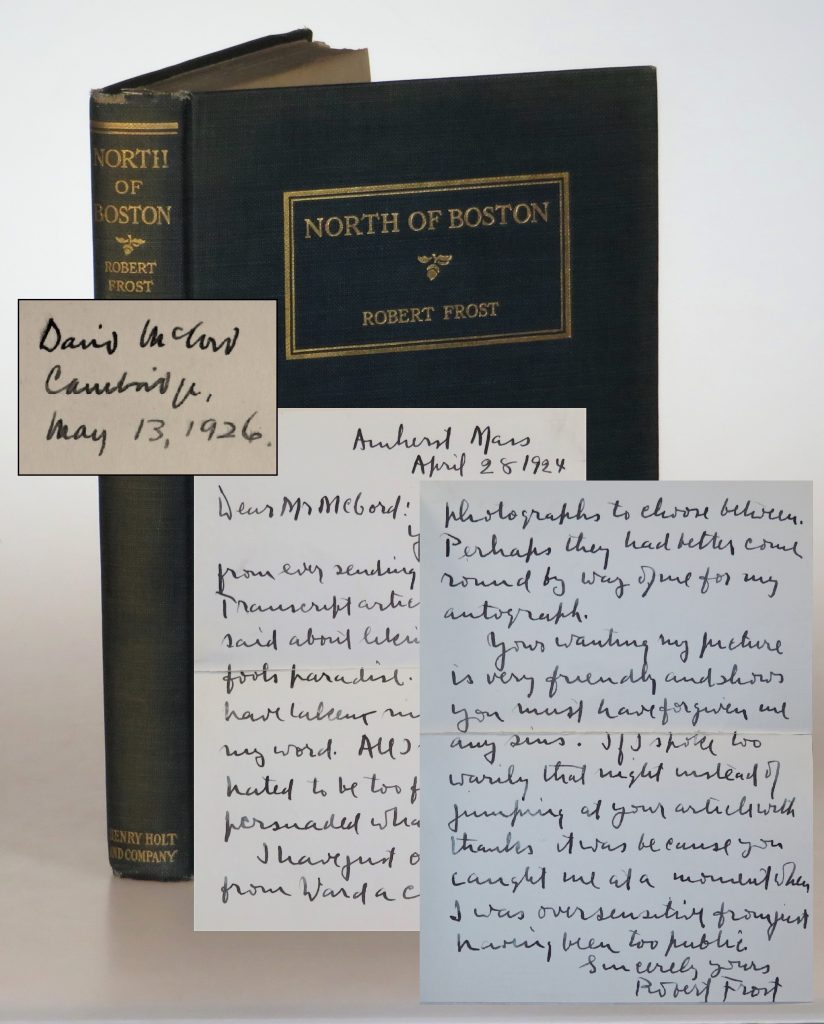
We recently acquired an intriguing 1915 U.S. edition of Frost’s second published book, North of Boston. The book was curious in two regards – first for the original autograph letter signed by Frost tipped onto the front free endpaper, but also for the publication history.
The publication history is the more arcane and less subtle of the two puzzles, but still impressively bibliographically byzantine. The copyright page of this copy of North of Boston features three printed lines thus:
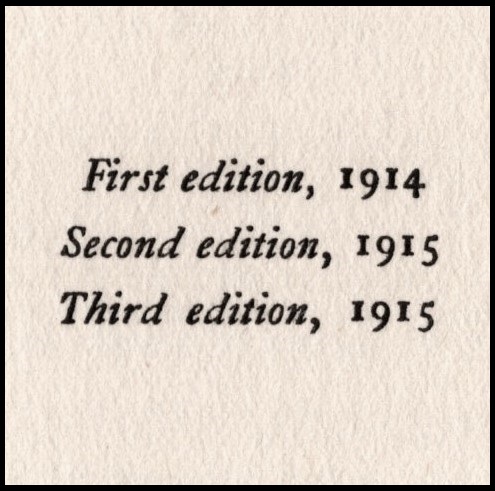
First edition, 1914
Second edition, 1915
Third edition, 1915
The curious bit is that even bibliographers don’t seem quite in accord. Joan St. C. Crane states that the “Second American Edition” of North of Boston was published in 1919 and calls the first American edition of 1915 just that – the “First American Edition”. This obviously prohibits a “Third edition” published in 1915. W. B. Shubric Clymer and Charles R. Green designate the First American edition of 1915 as “Second American Edition”, but detail no editions thereafter. Neither bibliographic designation allows for a “Third edition” issued by Henry Holt and Company in 1915 – which is what the publisher states we have here.
The binding of this copy is the same size, material, and style as that of the first American edition printed and published by Holt in 1915. The binding is the same dark gray-blue fine linen cloth. The contents are printed on the same rough wove white paper with untrimmed fore and bottom edges. So what is this book? Here’s the story.
That Robert Lee Frost (1874-1963) became the poetic voice of New England is a bit ironic; Frost was born in San Francisco and it was a 1912 move to England with his wife and children – “the place to be poor and to write poems” – that catalyzed his recognition. A Boy’s Will was completed in England, published by David Nutt in 1913. A convocation of critical recognition, introduction to other writers, and creative energy supported the 1914 English publication of Frost’s second book, North of Boston, after which “Frost’s reputation as a leading poet had been firmly established in England, and Henry Holt of New York had agreed to publish his books in America.”
The 1914 British first edition sheets were issued in a diverse array of bindings (designated A-F) over the course of a decade. Among these many bindings of the first edition, the one designated “B” was comprised of 150 copies in brown cloth-backed boards. These were the 1914 first appearance of North of Boston in America. This was not a separate edition, but rather just an issue of the British first edition sheets, bound with a Holt cancellans title-leaf. (see Crane A3.1.)
The first American edition – the first edition printed in America for American publication – was published by Holt in late March 1915. This is the edition referred to on the second line of the copyright page of this copy as “Second Edition, 1915”. More accurately informative would be “First American edition, 1915”. The third line of the copyright page – “Third edition, 1915” – is just plain bibliographically incorrect. This copy is accurately described as the second printing of the first American edition, which given the print history on the copyright page, was issued the same year as the first printing. The actual third edition – an illustrated edition in an entirely different binding and limited to five hundred copies – was not published by Henry Holt until 1919.
So, small mystery solved. Amusingly, the folks who printed the book were wrong and this is the First American edition, second printing, of 1915 rather than “Third edition, 1915”.
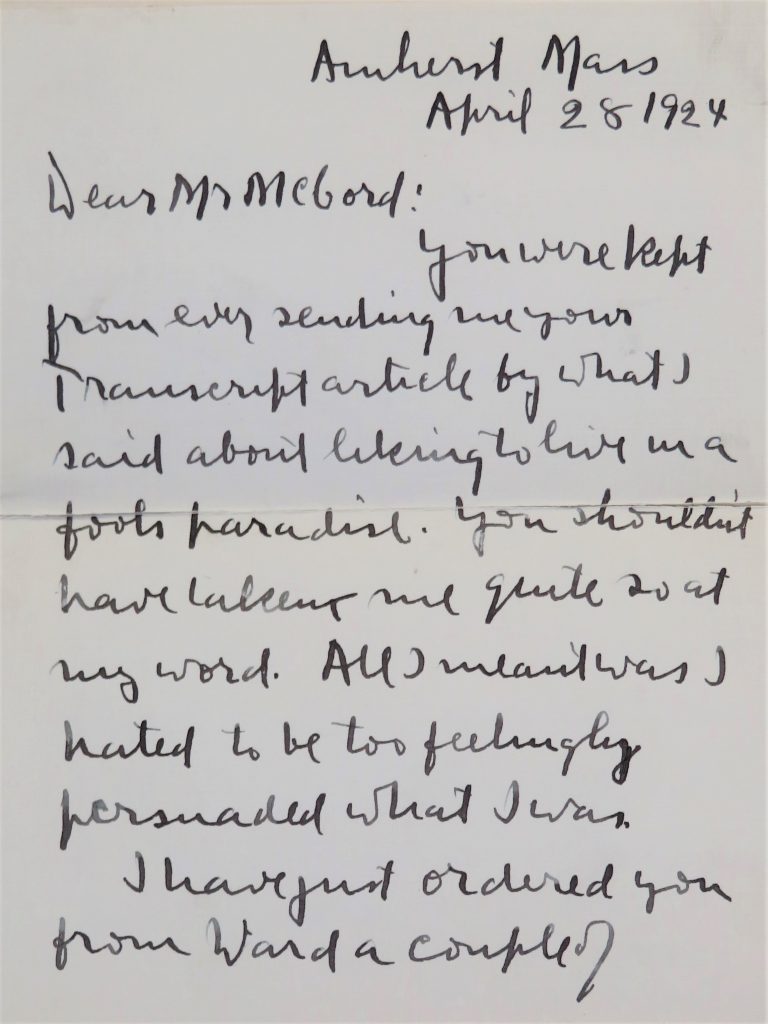
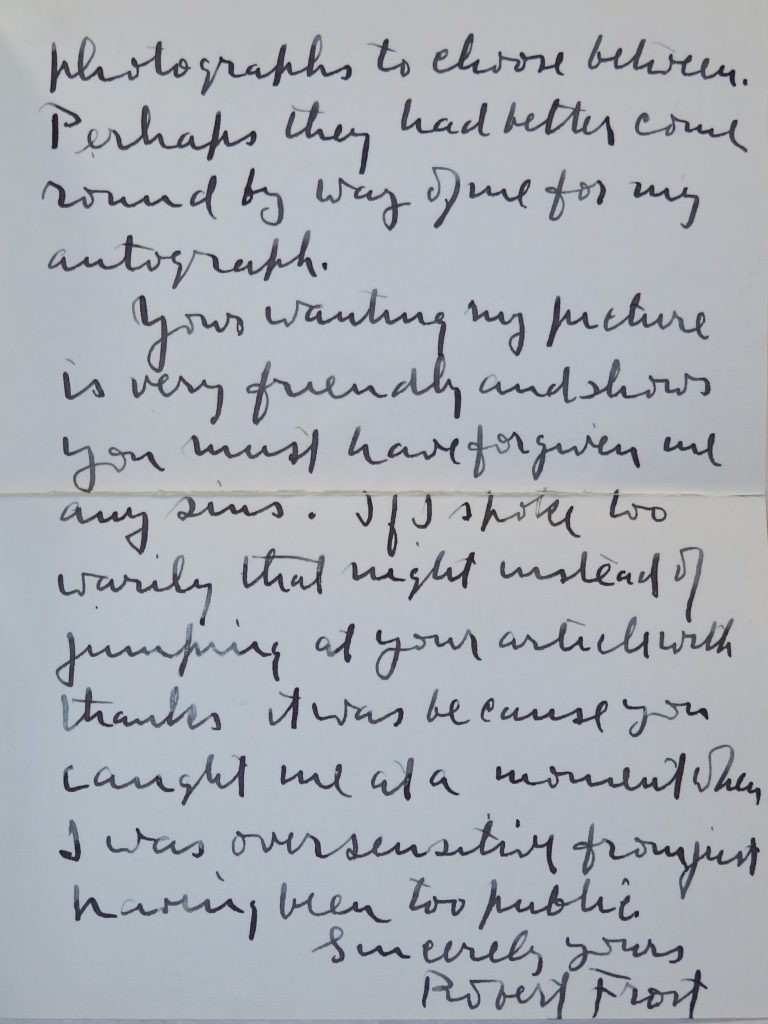
Now the more interesting bit – the letter. The letter, written entirely in Frost’s hand in black ink, filling both sides of a single sheet of blank stationery twice folded and tipped onto the front free endpaper recto, reads:
Amherst Mass | April 28 1924 | Dear Mr McCord: | You were kept | from ever sending me your | Transcript article by what I | said about wanting to live in a | fools paradise. You shouldn’t | have taken me quite so at | my word. All I meant was I | hated to be too feelingly |persuaded what I was. | I have just ordered you | from Ward a couple of | photographs to choose between. | Perhaps they had better come| round by way of me for my | autograph. | Your wanting my picture | is very friendly and shows | you must have forgiven me | any sins. If I spoke too | warily that night instead of | jumping at your article with | thanks it was because you | caught me at a moment when | I was oversensitive from just | having been too public| Sincerely yours | Robert Frost.
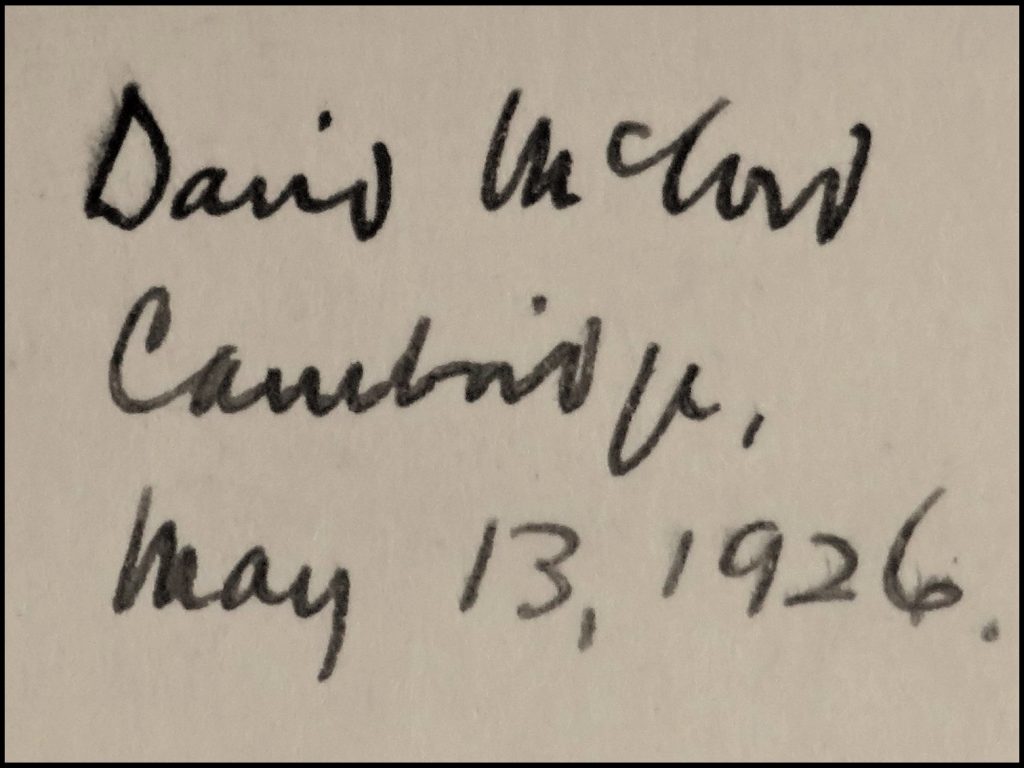
At the upper right corner of the front free endpaper to which the letter is affixed, the subject “Mr McCord” did us the favor of leaving the only other previous ownership mark in the book – “David McCord | Cambridge, | May 13, 1926.”
Armed with this information, we did our usual homework. From the letter’s salutation and previous ownership name, city, and date, we are able to confirm a substantial association.
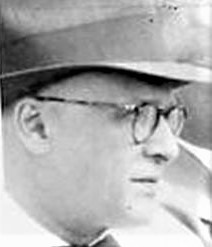
David Thompson Watson McCord (1897-1997) was just 26 years old when the 50-year-old Frost wrote him this letter. A poet himself, McCord had graduated in the Harvard class of 1921 and earned his master’s in chemistry there the following year. For 38 years he was director of the Harvard Fund, retiring in 1963 – the year Robert Frost died. McCord became and remained a personal – and valuable – friend to Frost.
As for Frost, a move led McCord to his poetic voice; when he was twelve, he moved from New Jersey to Oregon to live on a remote farm with his uncle. “It was there, on the edge of the wilderness, that he began to learn to write.” (Mike Pride: A forgotten review of Robert Frost’s ‘New Hampshire’)
In 1938 McCord proposed that Harvard Press publish a collection of poetry edited by Frost. The book was negotiated and a contract was signed but Frost never produced the volume, likely due to personal tragedy; Frost’s wife, Elinor, died in 1938, and McCord served as one of her pall bearers. McCord continued to champion the elder poet; he chaired the committee that established the Emerson-Thoreau Medal which was bestowed on its first recipient, Robert Frost, in 1958. And in 1962 McCord played a critical part in Harvard’s role in the resolution conferring the Congressional Gold Medal on Frost. Harvard honored the achievements of McCord with the award of its first honorary degree of Doctor of Humane Letters in 1956. He was also the recipient of the first National Council of Teachers of English Award for Excellence in Poetry for Children, a Guggenheim Fellowship, and a National Institute of Arts and Letters grant. These accompanied a collection of honorary doctorates from 22 universities. McCord authored and edited more than 50 books and more than 500 children’s poems over his long life.
From the letter, it is reasonably easy to infer that at some public event the younger poet offered some bit of writing he wanted the older to read. Frost apparently declined, peremptorily and with some glib remark, which he later regretted. Consequently, he wrote McCord to mend fences, offering both apology, an explanation, and a signed photograph.
That was certainly enough information to figure that we’d never know exactly what McCord offered Frost and we had discovered enough to narratively frame both book and letter – which is really the extent of our job as booksellers.
But something about the letter insisted, branch tips gently tapping a winter windowpane. What I heard was “Pay attention” and “Look again.”
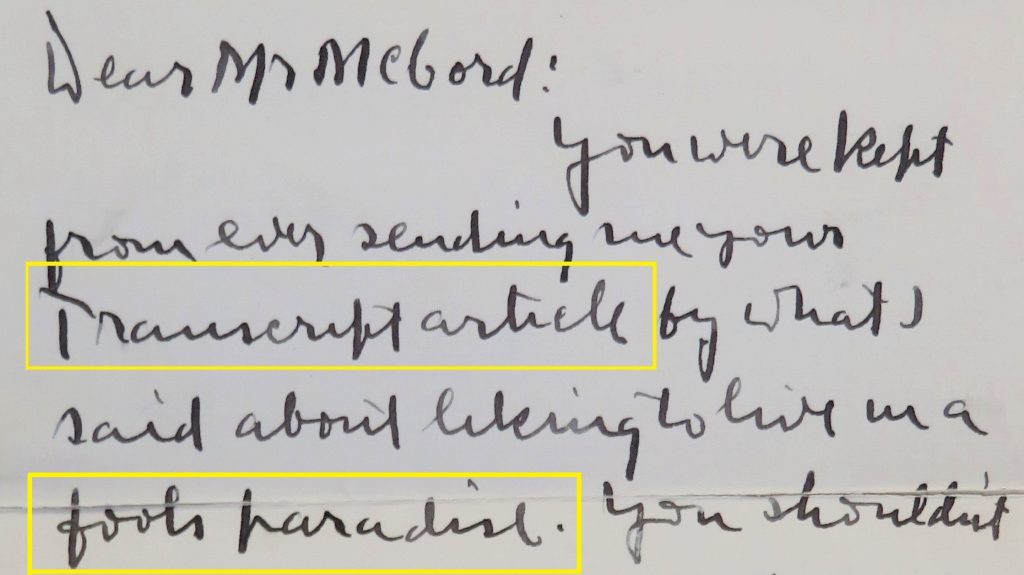
There was the capitalized “T” in “Transcript in the third line of the letter, preceding the word “article”. There was also the interesting reference to “what I said about liking to live in a fools paradise.” And there was the timing.
Frost published New Hampshire, a Poem with Notes and Grace Notes in mid-November 1923. March and April 1924 found the poet lecturing in places like Chicago, Fort Wayne, Terre Haute, Indianapolis, and Richmond (Indiana). The lecture schedule may contextualize Frost’s closing explanation to McCord: “You caught me at a moment when I was oversensitive from having just been too public.”
In early 1924, Frost was read and regarded, but his fame was still new and not yet fully fledged. But on 12 May 1924, two weeks after this letter was written, it was announced that Frost had been awarded the Pulitzer. It was only the third Pulitzer awarded for poetry and the first of an eventual four Frost would receive (1931, 1937, and 1943).
It turns out that a young Harvard chemist named David McCord wrote a review of New Hampshire. That review was published in the Boston Evening Transcript on 8 December 1923. Undoubtedly, it was this article which McCord had offered to Frost to read. The “fools paradise” comment of course refers to Shakespeare’s phrase, encapsulating a state of contentment based on ignorance or false hope. This must have been the phrase Frost used when he dismissively refused McCord’s offer of his review.
Thankfully, McCord’s review is not lost to history; it is currently published on the Pulitzer website. It is both insightful and urbane. And it is decisively complimentary of Frost.
Of the book, McCord wrote:
Perhaps the subtitle is misleading. The “notes” are nothing less than poems of moderate length, each fastening a vital tendril upon individual lines or parts of the central poem, and the “grace notes,” which will be the first read and the most admired, are brief lyrics, small shatter fragments of clear beauty, the not too remote supplements of their larger-bodied brothers.
Of the poet himself, McCord wrote:
It becomes more and more apparent that Robert Frost is New England’s most authentic poet, and by authentic poet we mean the most sincere, foursquare and forthright who has tried to lay a finger on the slow and positive pulse of the New England north of Boston and sound the secret of its heart… In his creative mood we may think of him as leaning across a stone wall in the hush of a summer afternoon and talking intimate-fashion… with almost everything that Robert Frost has done one shuffles through the autumn leaves upon a lonely road – and enjoys it immensely.
We can only assume that, subsequently to snubbing McCord, Frost read the review and, having done so, was chagrined and reached out to McCord.
If this was not the first correspondence of the two men, it was certainly quite early in their relationship.
Frost spent his final decade and a half as “the most highly esteemed American poet of the twentieth century” with a host of academic and civic honors to his credit. Two years before his death he became the first poet to read in the program of a U.S. Presidential inauguration (Kennedy, January 1961).Two years before McCord’s death at the age of 99, in 1995 The Boston Globe published an article titled “The Forgotten Poet” about McCord’s lonely wait in a nursing home, “crumpled in a wheelchair, one of the great writers of children’s verse in 20th century America… living his final days in obscurity.”
There are indeed many kinds of winter, some less harsh than others.
Wishing you the blessings of the season. Whether you are blanketed in snow or bathed in sun, may this December find you in the company of good people and good books.

One thought on “Lovely, dark and deep”